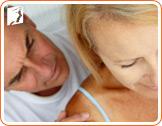
Loss of libido is, perhaps, one of the most common symptoms women experience during their menopausal years. With a myriad of other symptoms that occur in conjunction with loss of libido, such as fatigue, vaginal dryness, and hot flashes, sexual desire is typically put on the backburner. However, while you are the one experiencing loss of libido, it can impact your relationship with your partner, if discussion is ignored. Should you care that your sex drive is declining during menopause? Or is this simply a natural life transition to be accepted rather than fought? Keep reading to learn more.
What Causes Loss of Libido during Menopause?
Before delving further into libido loss, it is important to know what causes it. For your entire adult life, your hormones have been more or less balanced. Menopause involves the temporary loss of this balance. Your estrogen levels drop, your periods become irregular, and you're more prone to mood swings. In the midst of all this, decrease in sex drive is understandable.
But you can combat these symptoms. The question is, are the side effects of prescription and alternative medicines worth the trouble?
Treatment or Not? Coming to a Decision
Not sure whether you should seek treatment for libido loss? Here are a few things you should consider.
Frequency. While libido loss can hurt relationships, many couples report happy, healthy relationships while having intercourse progressively less often.
Perception. Many men and women enjoy sex for the act itself, so experiencing a decrease in sex drive can be unpleasant. However, if the shift in your sex drive is not a concern to you, there is no need to treat it.
Libido loss is normal. A majority of women experience some drop in sex drive during and beyond their menopausal years.
Many older men also experience libido loss. Your partner may also have a lower sex drive than he has had in the past, which is the result of a slow decline in testosterone levels with older age.

If you want to seek treatment, what are your options? Fortunately, simple changes in lifestyle such as eating better and regularly exercising are good ways to make your body healthier and enhance the production of hormones that underlie your libido. Combined with alternative medicines to boost or balance your hormonal levels, these methods can be very effective.
Prescription medications should only be considered after other options are exhausted because of the possible adverse side effects, so talk to a doctor if you feel these would be best for you.
Sources
- Channon, L.D. and Ballinger, S.E. "Some Aspects of Sexuality and Vaginal Symptoms during Menopause and their Relation to Anxiety and Depression." British Journal of Medical Psychology. June 1986. 59(2): 173-80.
- Sarell, Philip, M.D. "Psychosexual effects of menopause: Role of androgens." American Journal of Obstetrics & Gynecology. March 1999. 180: 3S-II.
- Studd, John. "Loss fo Libido and Menopause." The Management of Menopause. Annual Review 1998. Partenon Publishing.



